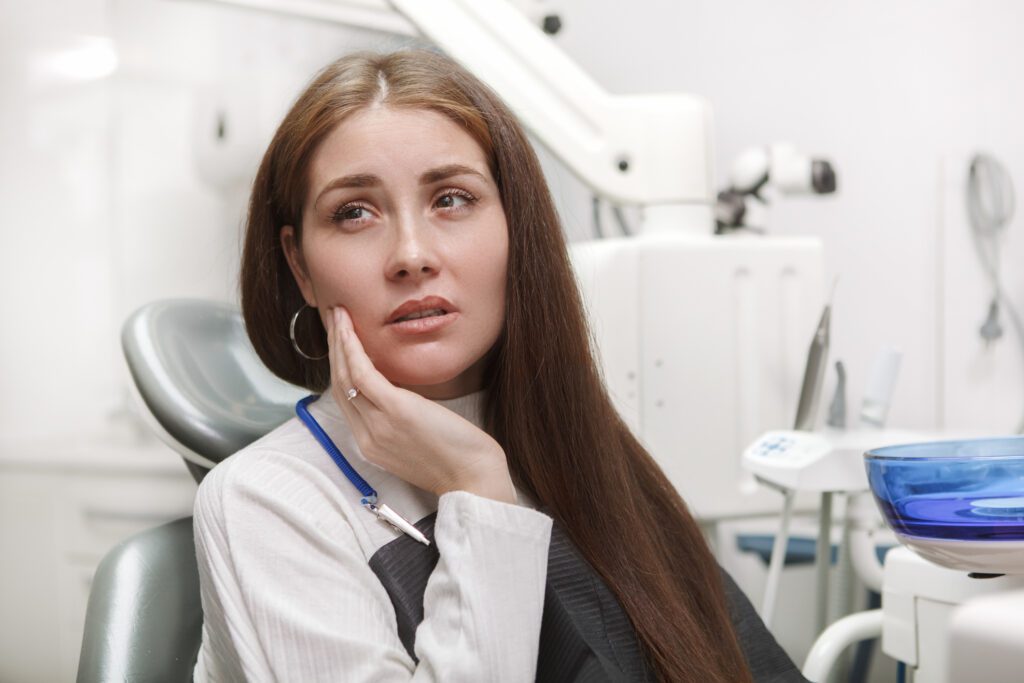If you’re facing a dental emergency, call East Quarter Dental at 469-943-1400 right away. Dental emergencies, like severe tooth pain, broken teeth, or a lost tooth, need immediate attention. Waiting too long to get care can make the problem worse, which could harm your oral health in the long run.
At our Dallas dental office, we can handle your emergency quickly and effectively. We’ll do our best to arrange same-day care. Once you arrive, we’ll perform an exam to find the cause of the problem and provide the treatment you need to relieve pain and repair any damage.

Emergency Dental Care in Dallas, TX
We commonly treat emergencies like toothaches, knocked-out teeth, broken teeth, and damaged dental restorations. Let’s explore some of these issues and how we can help.
Tooth Pain
Toothaches can happen for many reasons, including cavities, injuries, or infections like an abscess. Severe pain is often a sign that something is wrong and needs prompt care. While waiting to see the dentist, you can take an over-the-counter pain reliever and rinse your mouth with warm salt water to reduce bacteria. If your face is swollen, a warm compress can help ease the swelling.
Once you arrive, we’ll examine your tooth to figure out what’s causing the pain. If it’s a cavity, we may treat it with a filling. If the pain is from an infection, like an abscess (a pocket of pus near the tooth), we may need to drain the infection or perform an emergency root canal to save the tooth. Treating an abscess early can stop it from spreading and causing more serious problems.
Knocked-Out Tooth
If you lose a tooth because of an accident, act fast. Try to locate the tooth, and handle it only by the crown (the part you chew with), not the root. Gently rinse the tooth with milk or your saliva, but avoid using water. Do not try to push the tooth back into the socket.
Bring the tooth to our office as quickly as you can, keeping it moist in a cup of milk or saliva. If we see you soon enough, we may be able to reattach the tooth. If that isn’t possible, we can recommend replacing it with a dental implant, which looks and feels like a natural tooth.
Broken Tooth
If you have a chipped or cracked tooth, try to collect any broken pieces. Don’t use glue to reattach them! Place the pieces in a cup of saliva to keep them moist and bring them with you to our office.
Depending on the extent of the damage, we may be able to restore the tooth with bonding or a crown. If the tooth is severely damaged, we might recommend an extraction and discuss options for replacing it. Treating a broken tooth quickly can prevent further damage or infection. You want as little bacteria as possible getting inside the tooth through the crack.
Broken or Lost Restorations
If a crown, bridge, or denture breaks or falls out, do not try to repair it yourself. Attempting to fix it with glue or tape could cause more damage or harm your mouth. Instead, call our office right away.
We can often repair a damaged restoration or provide a temporary replacement while we create a new one. Restoring your dental prosthetic quickly will help you avoid discomfort and ensure your smile stays functional and healthy.
Soft Tissue Injuries
Injuries to the gums, tongue, or other soft tissues in your mouth can be alarming, but they are not always emergencies. If you’re bleeding, rinse your mouth with salt water and apply pressure to the area with gauze or a clean cloth. Over-the-counter pain relievers can help ease discomfort.
However, if the bleeding doesn’t stop, you should seek immediate care. In some cases, an ER may need to place stitches to close the wound.
Preventing Dental Emergencies
Dental emergencies can happen anytime, but many are preventable with good habits and regular care. A dental emergency might include a knocked-out tooth, a cracked tooth, sudden tooth pain, or a serious gum infection. These situations can be painful, stressful, and expensive.
Brush and Floss Every Day
One of the easiest ways to prevent dental problems is to brush your teeth twice a day and floss once a day. Brushing removes food, plaque, and bacteria that build up on your teeth. Flossing removes debris between your teeth and under your gums where a toothbrush can’t reach. When you skip brushing and flossing, plaque builds up, leading to cavities, gum disease, or infections that may become emergencies.
Visit the Dentist Regularly
Regular dental checkups are very important. Your dentist can spot small problems before they turn into big ones. A tiny cavity might not hurt at first, but if you leave it untreated, it can grow and cause severe tooth pain or even an infection. You can catch these issues early by seeing your dentist every six months and avoid emergency visits later.
Wear a Mouthguard During Sports
Always wear a mouthguard if you play contact sports like football, basketball, or hockey. Mouthguards protect your teeth from getting chipped, broken, or knocked out. Even if you’re just riding a bike or skateboard, accidents can happen fast. A custom mouthguard made by your dentist offers the best fit and protection.
Avoid Chewing Hard Objects
Chewing on hard things like ice, pens, popcorn kernels, or hard candy can crack or chip your teeth. Even biting your fingernails can cause damage. These habits might seem small, but they can lead to big problems if a tooth breaks and needs emergency care. Try to avoid these habits and use your teeth only for chewing food.
Don’t Ignore Pain or Swelling
If you feel tooth pain or gum swelling or notice something unusual in your mouth, don’t wait to get it checked. These signs could mean an infection or injury. Ignoring them might make the problem worse and lead to a dental emergency. It’s always better to catch and treat the issue early.
Practice Good Oral Hygiene
Using fluoride toothpaste, eating healthy foods, and drinking water instead of sugary drinks can help protect your teeth and gums. A healthy diet strengthens teeth and lowers your risk of cavities and infections.
FAQs About Emergency Dentistry
A dental emergency can happen to anyone. Learn more about them and their care below.
What are the most common dental emergencies?
The most common dental emergencies include severe toothaches, chipped or broken teeth, knocked-out teeth, dental abscesses, and loose crowns or fillings. Other emergencies can include injuries to the gums, tongue, or lips and broken dentures. It’s important to seek prompt treatment to prevent further damage, infection, or complications.
Can I wait until regular office hours to see a dentist for an emergency?
Sometimes, waiting for regular office hours may be possible if the issue is not urgent. However, if the issue involves severe pain, significant injury, or signs of infection, it’s important to seek immediate treatment. Delaying treatment can lead to more serious complications, so always be cautious and contact us immediately if you experience a dental emergency.
What happens if I don’t seek emergency dental treatment?
If you don’t seek emergency dental treatment, problems like infections, broken teeth, or abscesses can worsen. Infections can spread to other body parts, causing serious health complications. Unaddressed dental injuries, such as a knocked-out or cracked tooth, can lead to further damage and may be impossible to repair if left too long. Timely intervention can save teeth, prevent further damage, and reduce the risk of long-term complications.
Can I go to the emergency room for a dental emergency?
No, dental emergencies need to be treated by a licensed dentist, something most hospitals don’t have. If you have an injury to the soft tissue, an emergency room can provide stitches and care. Call our office immediately for care if it’s related to the teeth or your dental restorations.
How do I care for my teeth after a dental emergency?
Following aftercare instructions after a dental emergency is important. This may include taking prescribed medications, avoiding certain foods or activities, and practicing oral hygiene with gentle brushing and flossing. We may also recommend follow-up visits to ensure proper healing. Keeping up with routine dental care will help prevent future emergencies and keep your mouth healthy.
Can I use over-the-counter products for emergency dental care?
Over-the-counter products, such as dental cement, pain relievers, or desensitizing gels, can provide temporary relief in an emergency. However, they do not address the underlying issue and should not replace professional care. While these products can help with pain and discomfort, you should see us as soon as possible to fully resolve the problem and prevent it from worsening.
Get Help for Dental Emergencies Today
Don’t wait to get care if you’re experiencing a dental emergency. Call East Quarter Dental at 469-943-1400 right away, or schedule an appointment online if the issue is not urgent.
We proudly serve patients in Deep Ellum, Bryan Place, and the Dallas Downtown Historic District. If you’re unsure whether your situation is an emergency, contact us, and we’ll guide you on the next steps.
